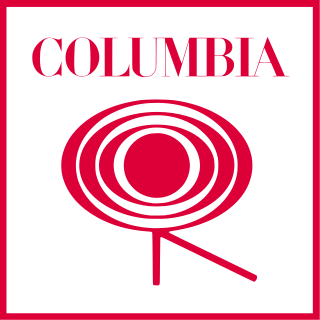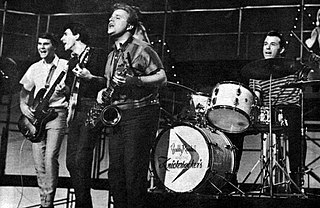| Challenge Records | |
|---|---|
| Founded | 1957 |
| Founder | Gene Autry, Joe Johnson |
| Defunct | late 1960s |
| Status | Sony/ATV Music Publishing holds the catalog |
| Genre | Rock and roll |
| Country of origin | United States |
| Location | Los Angeles, California |
Challenge Records was founded in Los Angeles in 1957 by cowboy singer Gene Autry and former Columbia Records A&R representative Joe Johnson. Autry's involvement with the label was short lived as he sold his interest to the remaining partners in October 1958.

Los Angeles, officially the City of Los Angeles and often known by its initials L.A., is the most populous city in California, the second most populous city in the United States, after New York City, and the third most populous city in North America. With an estimated population of four million, Los Angeles is the cultural, financial, and commercial center of Southern California. The city is known for its Mediterranean climate, ethnic diversity, Hollywood and the entertainment industry, and its sprawling metropolis. Los Angeles is the largest city on the West Coast of North America.

Orvon Grover "Gene" Autry was an American singer, songwriter, actor, musician and rodeo performer who gained fame as a singing cowboy in a crooning style on radio, in films, and on television for more than three decades beginning in the early 1930s. Autry was the owner of a television station, several radio stations in Southern California, and the Los Angeles/California/Anaheim Angels Major League Baseball team from 1961 to 1997.

Columbia Records is an American record label owned by Sony Music Entertainment, a subsidiary of Sony Corporation of America, the North American division of Japanese conglomerate Sony. It was founded in 1887, evolving from the American Graphophone Company, the successor to the Volta Graphophone Company. Columbia is the oldest surviving brand name in the recorded sound business, and the second major company to produce records. From 1961 to 1990, Columbia recordings were released outside North America under the name CBS Records to avoid confusion with EMI's Columbia Graphophone Company. Columbia is one of Sony Music's four flagship record labels, alongside former longtime rival RCA Records, as well as Arista Records and Epic Records.
Contents
The label's first success came with instrumental group the Champs, who had their biggest hit in 1958 with "Tequila", a Latin-flavored Rock and roll instrumental song written by Daniel "Danny" Flores and recorded by the Champs themselves. "Tequila" became a #1 hit on both the pop and R&B charts at the time of its release and continues to be strongly referenced in pop culture to this day [1] .

The Champs were an American rock and roll band, most famous for their Latin-tinged instrumental "Tequila". The group took their name from the name of Gene Autry's horse, Champion, and was formed by studio executives at Gene Autry's Challenge Records to record a B-side for the Dave Burgess single, "Train to Nowhere". The intended throwaway track became more famous than its A-side, as "Tequila" went to No. 1 in just three weeks and the band became the first group to go to the top spot with an instrumental that was their first release. The song was recorded at Gold Star Studios in fall 1957, and in 1959 won the Grammy Award for Best R&B Performance. It sold over one million copies, and was awarded a gold disc by the RIAA.
"Tequila" is a 1958 Mexican-flavored rock and roll instrumental written by Daniel Flores and recorded by the Champs. "Tequila" became a #1 hit on both the pop and R&B charts at the time of its release and continues to be strongly referenced in pop culture to this day.
Rock and roll is a genre of popular music that originated and evolved in the United States during the late 1940s and early 1950s from musical styles such as gospel, jump blues, jazz, boogie woogie, and rhythm and blues, along with country music. While elements of what was to become rock and roll can be heard in blues records from the 1920s and in country records of the 1930s, the genre did not acquire its name until 1954.







